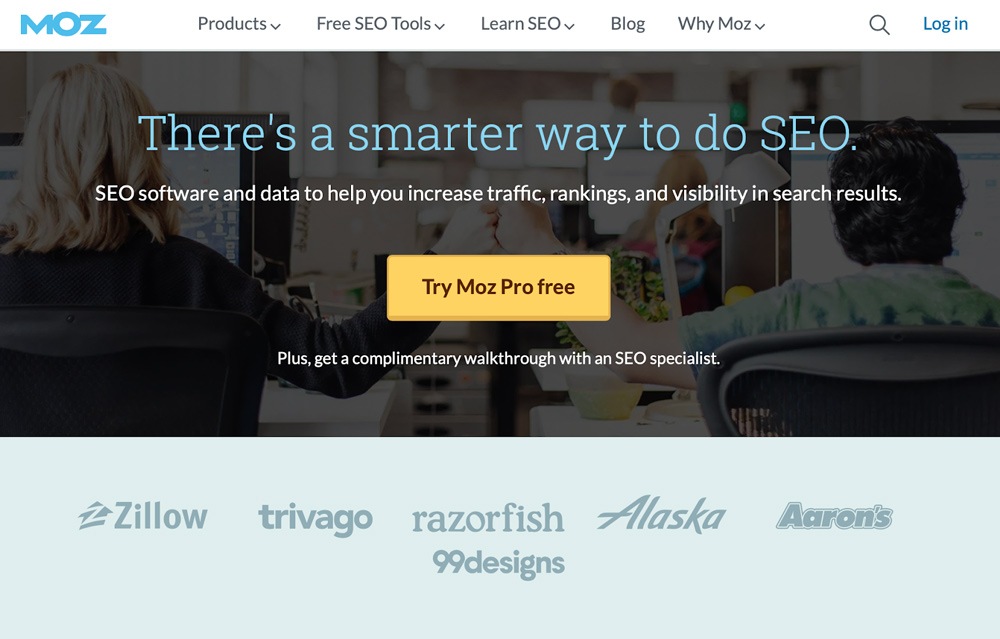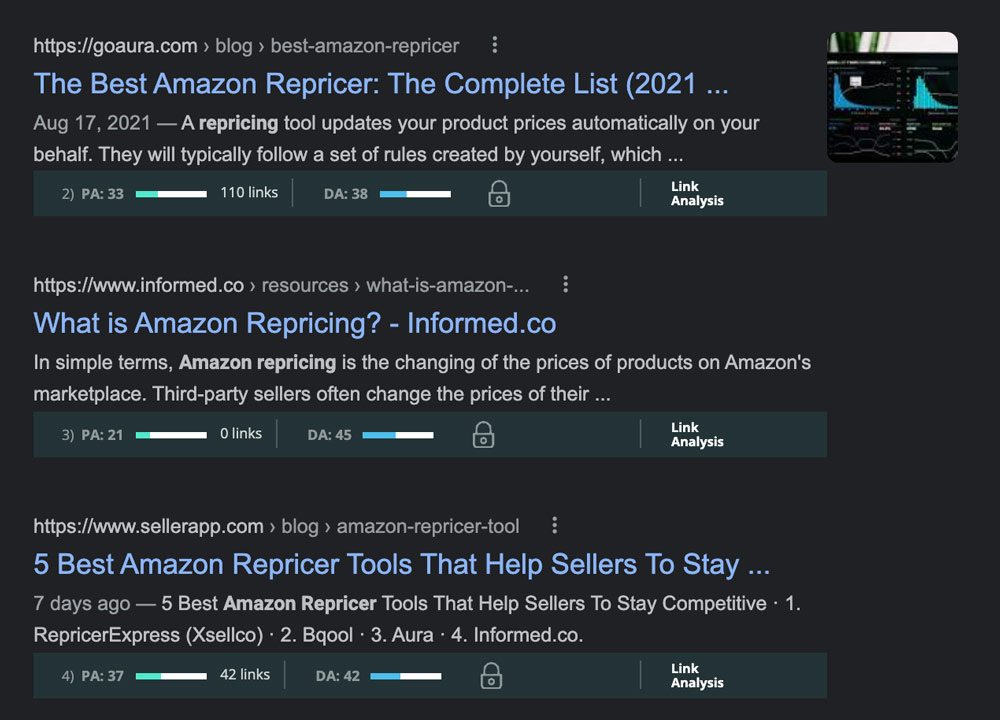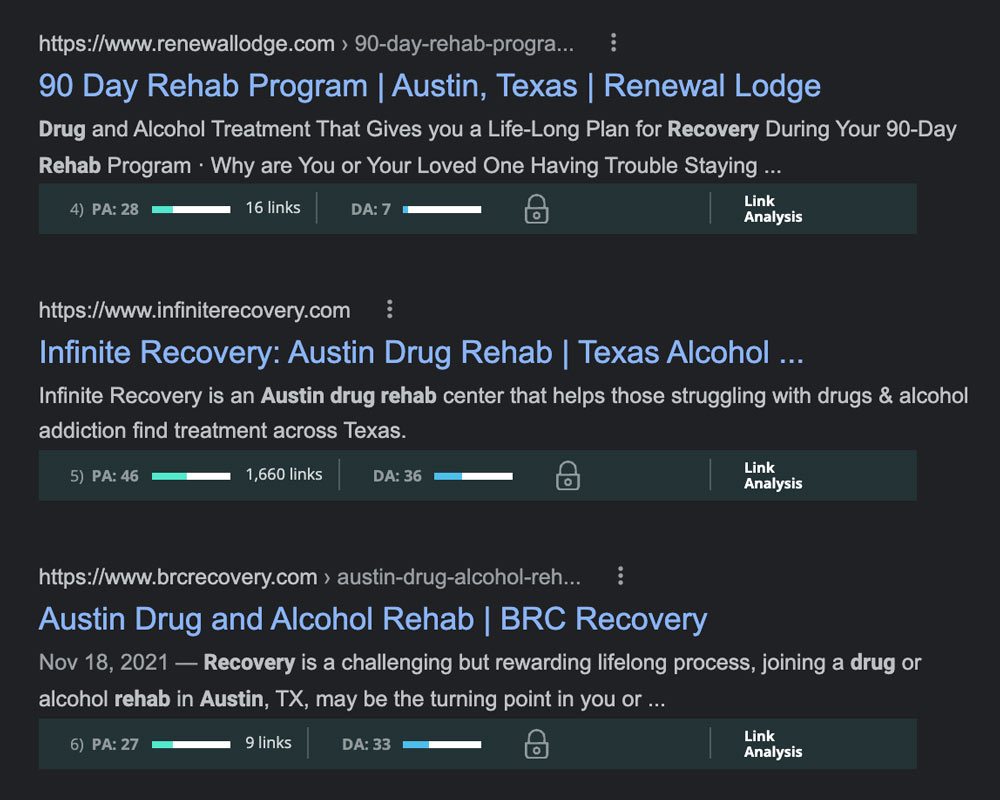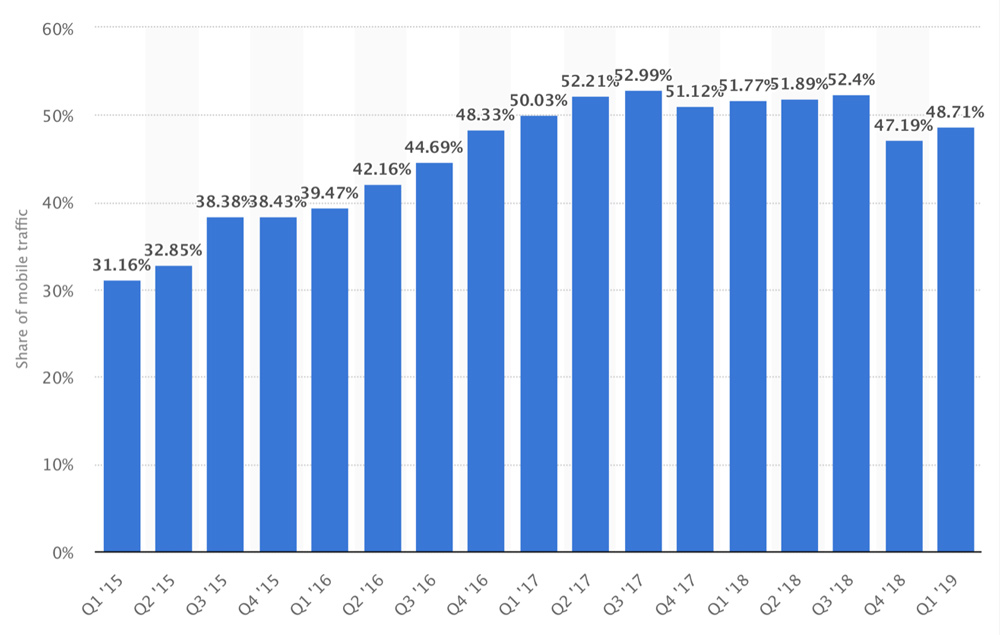Last updated on November 23rd, 2023
You’ve probably heard of domain authority before but aren’t quite sure what it is and how it can help your website rank better in search engines. So today, we’re going to talk about what this metric is, how it’s calculated, and what you can do to rank higher for it.
Does it affect your website’s ranking on Google search results? You’ll also find the answers to that.
Stick around to understand this metric better and know how you can leverage this for your website by applying seven proven strategies for increasing domain authority
What Is Domain Authority?
Domain authority is a website score between 0-100 that’s developed by Moz.

Ahrefs has something similar they call domain rating. The higher it scores, the better potential it has to rank high. It aims to predict how a website will rank in search engines.
It takes into account several known factors that potentially affect SERP rankings like total links. Since it’s an algorithm developed by Moz, the domain authority score depends on what Moz knows about your website.
While it simulates Google’s ranking score (PageRank) it can only predict ranking success, not represent it. Google doesn’t use this metric to increase your website’s rank on its search results.
It’s been said Google uses hundreds of ranking factors while domain authority only considers 40 factors.
In other words, your website’s domain authority won’t accurately reveal how your website will rank on Google. Instead, it will determine the competitiveness of your website when put side by side with websites of the same niche.
So it’s normal to see a website with a low domain authority rank well on Google. In addition to that, domain authority doesn’t consider Google penalties so while it loses its ranking on Google, it can still have high domain authority.
With that in mind, you can largely use this metric to pick keywords strategically. The more strategic the keywords, the better chances for your website to rank well.
If that’s a bit unclear, here’s a comparison:
Say your website’s domain authority score is 70. When competing for a specific keyword against websites with domain authority lower than yours, well-written content on your end will have better chances of ranking compared to theirs.
On the other hand, if the domain authority of the website competing for that keyword is higher than yours, it tells you that it’s better to find another target keyword to work with.
Moreover, since this metric is based on a logarithmic scale, it will be relatively easier to increase your score from 20-30 than from 70-80.
To sum that up, you can use domain authority for comparison purposes, not as a metric to evaluate SEO performance.
How Is Domain Authority Calculated?
Like what was mentioned at the get-go, Moz uses 40 factors to determine a website’s domain authority. Here are 5 of the most important factors:
- MozRank: this factor is scored between 0-10 and considers the strength of websites linking back to yours. With this factor what matters is the quality of the website that links to you more than the quantity.
- MozTrust: almost similar to MozRank, MozTrust is a factor that measures the quality of external links. Trusted websites like .edu or .gov get your website a higher score.
- Linking Root Domain: this factor takes into account the number of unique backlinks your website earned. You’ll get a higher score when links are from separate sites than if it only comes from one no matter how many the links are.
- Social Signals: this factor considers the engagement your content has whether it’s like, comment, or share on social sites. The more engagements it has, the higher the score you’ll get.
- Search Engine Friendliness: this factor is about your website’s structure. The easier it is to navigate, the easier it is for research engines to crawl and index pages in it; thus you get a higher score.
What Is A Good Domain Authority Score?
Good domain authority doesn’t always mean you get a score of 100. You have to take competing websites into consideration.
Again let’s pretend your website has a 70 domain authority. Checking your direct competitors, you find out that their domain authority ranges from 40-50. With this comparison in mind, you can conclude that your domain authority is excellent.
Simply said, your domain score depends on your competitors. If yours is higher, it’s good domain authority. Conversely, if it’s lower than that of the competitors, it’s automatically worse and you have to work on it more.
Here’s an example for a website competing for the keyword: “Amazon repricing”. Assuming that you own Aura, seeing that the other two websites have higher domain authority than yours, you can safely conclude you currently have a bad domain rating.

Whereas if you look at Infinite Recovery, this website ranks three points higher than the second-highest competitor for the keyword: “Austin drug rehab”. This indicates a good domain authority score albeit just a slight difference.

Now if you’ve checked on Moz and discovered a poor domain rating, here are seven means to boost your website’s domain authority.
7 Means To Boost Domain Authority
Choose A Good Domain
If you have yet to choose a domain name, pick one that’s relevant to your website, something that immediately hints to people what your website is about.
As an example, consider the website CartStack. The website is about recovering abandoned cart sales where they also offer abandoned cart email templates. The word “cart” incorporated in the domain name quickly gives you an idea it’s an email marketing campaign for cart abandonment.
Another example is GrowthRocks which is a growth hacking website. Incorporating the word “growth” immediately tells you the website is about progress or scaling.
You can also be a bit creative like the domain LiquidityCure for a bookkeeping website.
Also, a good domain is something easy to remember. If you’re in a saturated niche and all the good related domain names are already taken, think of one that’s catchy enough to stick to the memory instantly.
A great example of this is a local online food shop called WhatsGood. The domain name uses common words so it’s easy to remember and catchy enough to instill in people that the food you find here is good, leaving a positive impression on those who hear the name.
The last critical thing to consider is if you decide to purchase an aged domain name, make sure the previous owner doesn’t do sketchy business with the website, or else, even if you’ve poured out all effort in implementing SEO strategies, it still won’t get a good domain authority score and Google ranking.
We learned that the hard way. So I suggest researching the domain name first and checking what results show up to see if it’s a good domain with a high potential to rank.
Improve On-Page SEO
On-page SEO involves every element of pages and content in your website. Here are the elements that should include your target keyword/s or variations of your target keywords.
- Titles and descriptions
- Subheadings
- Website copy
- Content paragraphs
- URL
- Alt text for images
Just remember to avoid keyword stuffing or needless use of the keywords just for the sake of adding them to the content. Check out Close’s predictive dialer keyword-rich content or Grove’s employee onboarding blog that isn’t stuffed with unnecessary keywords.
Other elements you should optimize are:
- Proper use of heading (H1, H2, H3, and so forth) on your content
- Adding related media elements and infographics
- Structuring content in a way that it can get rank for Google’s featured snippets
- Internal links
Internal links are a powerful SEO technique that directs visitors to related articles within your website. It also increases pageviews on content that are published some time ago.
Usually older content tends to get buried deep in the catalog of blog posts. Linking to them will make it easier for Google to crawl and index those pages to get ranked.
It’s always great to have fresh quality content to maintain a steady flow of visitors to your site.
Work On Off-Page SEO
Off-page SEO is mainly about gaining quality backlinks from high-domain authority websites to yours. With this in mind, your link profile has to be strong to get a higher domain rating.
What makes a link profile strong?
You can conclude that a link profile is strong if:
- It generated incoming links for high authority sites and related websites
- It doesn’t have bad links or low-quality links (usually from low-authority/sketchy websites)
- It has a significant number of links from unique domains
If your website has bad links, you should take action to remove them. You can do this by contacting the website owners and asking them to add a “nofollow tag” to discredit the link or remove it completely.
You can also use Google’s disavow tool to take out the bad links from your profile.
Once you get this done, work on gaining more high-quality links for your website. There are two ways to get this done.
- Natural Link Building
To get linked to other websites naturally, your website has to provide great content worth linking to. It has to be engaging and contain valuable points they can share with their audience. Otherwise, they won’t have reasons to link to you.
It should contain useful insight and answers to questions most people are searching about online. Take advantage of the related keywords and “people also ask” questions in Google’s SERP. Consider using these questions to be subheadings for your content.
To get ranked for featured snippets, the first paragraph of your subheading should accurately answer or provide information about the subheading. It will also be helpful if you can incorporate images, tables, and lists.
A great example of snippet-worthy content is Videomaker’s color correction blog.
Link-worthy content needs time to create, but when done right, you won’t have to put in extra effort to ask other sites to link to yours.
With quality content, you’ll gain a high readership and more chances of getting natural links from other websites.
If you can’t generate links or only generate limited links using this method, consider the second option.
- Guest Blogging
To get good links, you can also reach out to related and quality websites about writing guest posts for them. Getting this chance will allow you a level of liberty in incorporating links to your site or the content you’ll make.
Enhance Technical SEO
Technical SEO involves optimizing infrastructure elements on your website. Once you get this done correctly, you don’t have to optimize them over and over again.
Here’s what technical SEO includes:
- Creating and optimizing an XML sitemap and submitting it to Google
- Registering your website on Google Search Console
- Migrating your website to HTTPS
- Adding schema or a cognitive framework to help search engines understand your website content’s context
- Ensuring a properly defined breadcrumb on all your site pages, including the menu
- Checking your robots.txt settings and using the Fetch as Google feature to ensure spiders crawl your website seamlessly
If you want to know more about SEO, check out this guide.
Make Sure Your Website Is Mobile-Friendly
Statista reports that more than half of website traffic is from mobile users. This means if your website is not mobile-optimized, you’ll risk losing half of the potential traffic for your website. It’s a loss you can’t afford.

Source: Statista.com
Additionally, Google includes mobile-friendliness as a ranking factor and is working in a mobile-first index so optimizing for this kind of device should be taken seriously.
When your website is mobile-friendly, you’ll be building credibility with your clients and offer a great user experience for website visitors. With these, they’ll look to your website as an immediate option which increases the likelihood of getting them to convert for your products and services.
When designing your website, always check if the mobile version is available and in order.
If you haven’t worked on the mobile-friendliness of your website yet, you can use Google’s mobile-friendly test to get insight and recommendations. You can also use Accelerate Mobile Pages (AMP) as support to your website.
Enhance Page Speed
Page Speed, as the name suggests measures how fast your website loads. The faster it is, the better chances for your site to get a higher rating. A 2-second load speed account for a 9% bounce rate and a 5-second load speed has a skyrocketing bounce rate of 38%.
Check your website’s loading speed using Google Developer’s PageSpeed tool. It analyzes your site’s load speed and also identifies ways on how you can improve it.
Page speed is also part of the Google algorithm so that is an additional advantage if you optimize it. Simply said, a faster page speed helps with Google rankings, domain authority, and even user experience.
To improve your page speed, you can outsource the job to a web developer, for example in Aloa, or do it yourself by:
- Upgrading plugins to the latest version
- Removing unnecessary plugins
- Upgrading to a more powerful server
- Using a caching plugin
- Optimizing image file size without compromising the quality for an image-heavy site like this costume online store
- Using streaming services like Youtube or other secure video sharing platforms for media
- Using a content delivery network for big CSS files
Increase Social Signals
Increasing social signals increases readership and the potential for backlinks. To do this, you need to:
- Increase social media platform followers
- Have an active social media presence by creating posts, commenting on posts, and liking posts
- Add a social media button on the majority of the pages of your website so it’s easily shareable
- Promote blog content on your social channels
Conclusion
Implementing all these strategies doesn’t happen overnight, let alone produce results in under a day. Patience is needed.
It will take some time for Moz crawlers to check and evaluate your site. But if you consistently implement the strategies above, you won’t just increase your website’s domain authority but also your website’s Google ranking.
But remember, domain authority isn’t a representation of your search engine ranking, it’s a prediction of your website competitiveness.
So take advantage of it the right way. Use it to determine the right keywords to target.
Boost your domain authority by:
- Picking a good and catchy domain
- Improving on-page SEO
- Working on generating backlinks naturally and through guest blogging
- Enhancing your technical SEO
- Building a mobile-friendly website
- Improving page speed
- And increasing social activity to generate more leads, readership, and potential backlinking opportunities
Keep in mind that a low domain authority doesn’t mean your website won’t perform well on the SERP, but a high domain authority tells you you’re on the right path in making your website better.
Implement one strategy at a time and each time you do, you’re one step closer to getting a higher domain authority other websites will be willing to link to. Try it now and start seeing results before you know it.

Author Bio
Burkhard Berger is the founder of Novum™. You can follow him on his journey from 0 to 100,000 monthly visitors on novumhq.com. His articles include some of the best growth hacking strategies and digital scaling tactics that he has learned from his own successes and failures.





Recent Comments